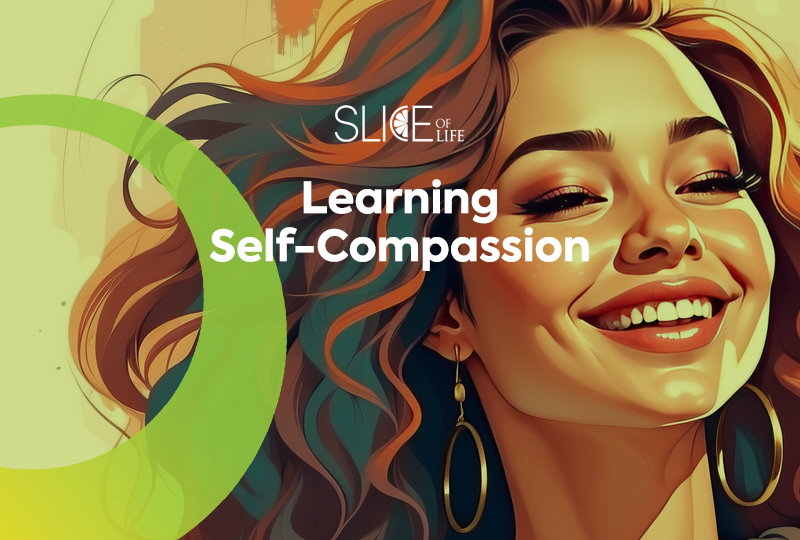The sad truth is, we are often our own toughest critics. Day in and day out, we suit up with our bright red boxing gloves, throwing gut punches of “I am not enough; I am inadequate; I am …” Fill in the blank with your own worst fears and insecurities. It’s no wonder we leave the rings of our minds feeling battered and bruised. There has to be a better way.
Dr. Kristin Neff has written a few vital books on the topic of Self-Compassion, including “Self-Compassion: The Proven Power of Being Kind to Yourself,” and her latest “Fierce Self-Compassion: How Women Can Harness Kindness to Speak Up, Claim Their Power and Thrive.” The main concept of what self-compassion is and how we can begin to practice it comes from selfcompassion.org.
Having compassion for yourself mirrors what you feel for others. Hopefully, if you have a healthy care for others, you can notice when they are suffering rather than try to ignore it for the sake of convenience or propriety. If you have a friend confessing to having a hard time and you dismiss it, that is not having compassion for that person; however, that is often what we do to ourselves, pushing off painful emotions as unimportant.
So, when we have compassion for others, that often means we feel a heart response to their pain and share in it in some large or small way. And the last and most difficult part of this compassion, as opposed to simple pity, is that we offer understanding and kindness to those around us instead of harsh judgment and condemnation for the mistakes they make and for their failures.
For some reason, it can often seem easier to give others grace than ourselves. We stuff our pain deep down inside and hope it doesn’t jump out like a demented Jack in the Box, but that unprocessed emotion has to go somewhere. Instead, take a moment to take a deep breath, acknowledge that “This is difficult for me right now,” and then develop coping skills you can take out of your toolbox and use whenever you need them, such as self-soothing through breathing, meditation and more.
Self-Compassion is not self-pity or indulgence.
None of us are perfect, so take that burden off yourself. Our world is broken, so things aren’t going to go your way all the time. It is important to distinguish self-compassion from self-pity and indulgence, however. Self-compassion looks at a personal pain from one place removed, saying “I acknowledge it is very difficult what I am going through right now; however, struggle is a natural and normal part of the human condition at times. Even though it may feel like it, I am not alone in my pain.”
It can be easy to swing into the wallowing depths of self-pity and self-indulgence, but be vigilant and try to resist those temptations. Try to come up with solutions that will help you in the long term. Self-pitying individuals will struggle to see past their own personal pain, while the self-indulgent can use it as an excuse to get away with whatever they want, such as staying all day in bed in a vain attempt to be kind to a stressed-out self. Rest, of course, is good and necessary, but the motivations must be examined. Self-compassion, instead, often means making meaningful steps toward necessary change out of a love for the self instead of the ineffective self-flagellation that often happens when people try to shame themselves into fixing a problem.
Lastly, self-compassion and self-esteem are also easy to confuse. Essentially, self-esteem refers to how we view ourselves based often on circumstances and achievements, but self-compassion does not change because it is based on the idea that all human beings deserve compassion and understanding, not for what they are or what they achieve.
Life University Resources
If you are a Life U student in need of mental health resources, please connect with Counseling Services for many different healing avenues available to you. Counseling Services is located in the Guy F. Riekeman, D.C. Center for Chiropractic Education (RCCE). For an individualized response to setting up counseling support, fill out the Counseling Support section on the bottom of the Counseling Services page.
Student Assistance Program (SAP)- Life University offers individual and couples counseling through the Student Assistance Program (SAP). SAP provides 24/7 availability of an off-campus counselor via phone.
Life University students can request face-to-face visits with an off-campus therapist and will be provided with six free sessions per year. In addition, students have six free coaching sessions available (via telephone), a text option for services as well as a dedicated Life U phone number. With the use of the dedicated phone number, students receive unlimited calls for services and immediate help from a mental health professional.
This service allows students consistent availability, including nights, weekends and/or holidays with a licensed mental health professional outside of the University. In addition, the service can be utilized by students’ dependents, which include spouses and children. You can contact SAP directly at 866.734.5890, text 94097 and/or request support at espyr.com (password – lifeu). A Counselor can also assist you in contacting SAP.
Counseling Wellness Workshops- During each quarter, Counseling Services offers several wellness workshops to give students a chance to discuss relevant therapeutic topics in a safe space, group environment. All wellness workshops and activities are held via Zoom unless otherwise noted in the event description listed on the Counseling Services page, under the “Counseling Wellness Workshops” tab. Visit Engage.life.edu to locate Zoom links or other information for each event.
Psychology Education at Life U
If today’s topic sparked a fire in your belly about learning more about psychology education and related careers, take a closer look at our B.S. In Psychology or M.S. in Positive Psychology programs.


Social Media